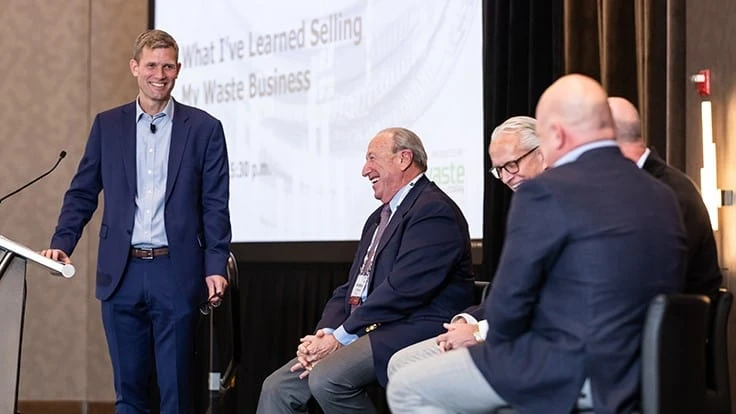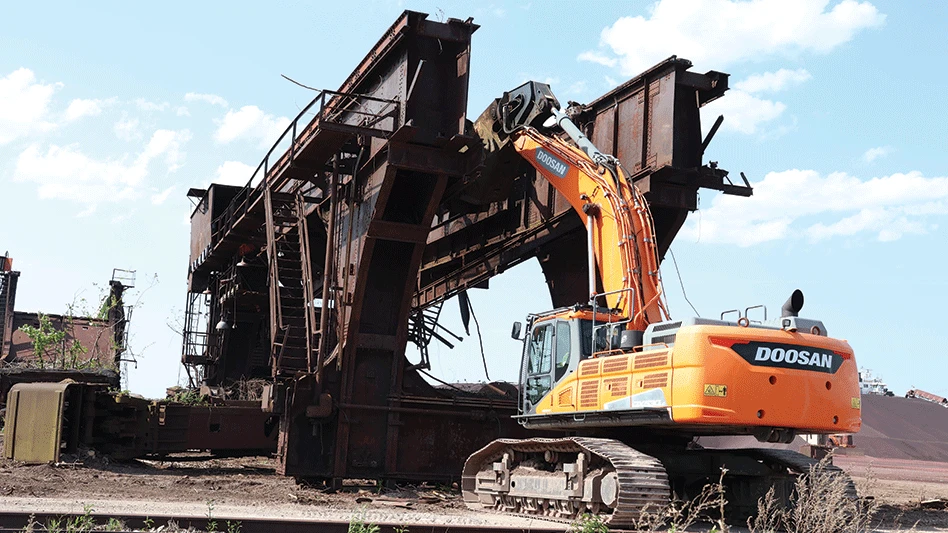
Courtesy of Mark Campbell Productions
The decision whether or not to sell is often a painstaking one for waste and environmental services business owners, but in an era marked by M&A activity, it is a decision many operators are being forced to consider.
At Waste Today’s Corporate Growth Conference, which took place Nov. 4 in Chicago, a panel of experts discussed what operators should know about the selling process in a session titled, “What I've Learned Selling My Waste Business.”
Moderated by Houlihan Lokey Managing Director Scott Sergeant, the session featured a panel that included Anthony Lomangino, former owner and CEO of Southern Waste Systems; Mike Malatesta, former owner and CEO of Advanced Waste Systems; James Devlin, chairman of the board of directors and CEO of Inframark LLC; and Danny Ardellini, founder and CEO of Environmental 360 Solutions.
According to Sergeant, every potential deal has distinct challenges that operators have to navigate.
“My team and I have executed 60-plus M&A transactions in the environmental services sector, and every one of those deals is different,” he said. “The deal dynamics are different, the ownership structure, the type of buyer, working toward the objectives, the culture and personalities and all the other nuances of the deal [are unique in each case].”
According to Lomangino, who successfully sold two companies to Waste Management, his decisions to sell were based both on the timing of the market and his desire to free himself from some of the financial responsibility of owning his companies.
“There are a number of reasons why people sell, but in my case, it was the timing of it,” Lomangino says. “You want to be wise and sell when the market is starting to peak. And also, you [have to assess what is] your individual tolerance for debt. So, we didn't [take on] private equity [partners] … so you get a lot more pressure on you that way, and that can get to you after a while. So, in my case, we grew it as much as we wanted to grow it, and the market timing was correct, so we just wanted to take some chips off the table and move on.”
For Malatesta, his foray into selling a business came when Covanta expressed its interest in acquiring Advanced Waste Services’ industrial waste business in 2015.
“We were going to be a platform company [of Covanta], and I started to see a lot of opportunity for the folks on our team that could be accelerated in a way that I couldn't accelerate it at the time,” he said. “And so, I personally said no, not interested [at first]. And I thought about it for a while. And then I started writing down some numbers and I thought, ‘Well, if we get to this number, I'm going to sell,’ and we eventually got to that number [which was $51.5 million, or around 8 times EBITDA.”
Malatesta also said that it was a good time to sell for the business because Advanced Waste was free from lawsuits, violations and other legal and regulatory entanglements at the time, which helped frame the business in a positive light and allowed the company to maximize its return.
For Ardellini, who was approached by GFL Environmental in 2009, it was a good time to sell because it helped relieve him of some personal debt he incurred in growing his business, but also, the opportunity allowed his team to stay onboard and intact following the acquisition.
“Obviously, multiple is everything when you're selling your business, but our employees became the foundation for the solid waste business at GFL,” he said. “So, it wasn't [like selling to one of the big public companies at the time who would come in and] get rid of all my management and dismantle everything we built. That was a very important part of my decision and merging with GFL—the employees would stay onboard.”
Malatesta also shared that one of the lessons he learned when selling his first business was the importance of bringing on third-party advisors rather than trying to sell the business on his own. This lesson hit home when the acquiring company called him late in the sales process to reduce its offer.
“Had I had professional representation, first of all, I never would have gotten that call,” he said. “Second of all, that call would have come to somebody else, and they would have told them that's not happening and these are the reasons why. I would never have wasted energy on that.”
Ardellini echoed Malatesta’s sentiments on the importance of seeking professional representation when selling a business in order to help make the process easier and free up the owner to concentrate on operations.
“Today, when I’m on the other side of the table buying companies and I interact with these owner-operators, I encourage them to go get professional help because the process of making the deal is one thing, but all the due diligence and all the follow-up becomes tedious,” Ardellini said. “These owner-operators are entrenched in running the day-to-day business, and you don’t want to distract them from that while they're getting an acquisition checklist together of 80 to 100 things that they have to do.”
In terms of assessing interest parties, Lomangino noted that sellers should both think about the multiple that is being offered as well as the likelihood that the acquiring company is going to see the deal through to its completion.
“If you're entertaining a number of different possible buyers, one of the main things you got to consider is who's the most likely to complete the transaction,” he said. “Are they big enough? Are they ‘bigger than the deal?’ It always helps if they are bigger than the deal because when you get to crossing the t’s and dotting the i's and you’re down to the finish line, if you’re dealing with scared money, they could jump away from the table after you’ve left everybody else behind.”
Lomangino also stressed the importance of keeping the prospect of a sale confidential to employees—both to keep business running as usual, but also, because no deal is certain to close due to various macro and microeconomic factors.
Finally, the panelists agreed that selling a business requires being able to mentally distance oneself from attachment to the company and being able to cope with the feelings of estrangement that may ensue following a sale.
“I always thought that my first company was one of my children, and I was worried about handing it off to the next person,” Ardellini said. “That was until I talked to my lawyer at the time who told me, ‘This is a business. You’ve done very well for yourself. Let it go.’ And it was hard for me to let go of my first company. It took me months to get over.”





